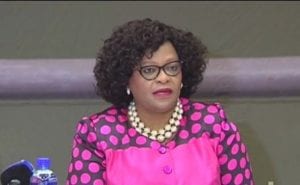
Nomvula Mokonyane, Minister of Water and Sanitation
The Department of Water and Sanitation has revealed plans to issue water cut notices to the top 30 defaulting municipalities, who will likely face water cuts by Friday 08 December 2017 if they fail to settle all their water debt older than 60 days.
Well within the law
Speaking at a media briefing on Monday Nomvula Mokonyane, Minister of Water and Sanitation, said that a total outstanding water debt of R10.7 billion currently exists, with 73% of this amount being outstanding for longer than 60 days.
The minister explained that the department’s decision to cut the water was a last resort after stakeholder consultations and legal processes failed to recover the outstanding debt.
While the media questioned the constitutionality of the Department’s decision, Mokonyane noted that the department was not acting outside the parameters of the law.
The Department is now implementing Section 59(3) (b) of the National Water Act, which allows the DWS to restrict or suspend the flow of water to defaulting municipalities.
Maintaining financial accountability
With debts escalating and the financial situation in the department looking bleak Mokonyane pointed out that the DWS has to answer to National Treasury and account for their recovery processes.
“When national treasury says to us demonstrate that you’ve gone all out to collect what is owed to you, we have something to show them. Up until now treasury has been looking at us and saying your revenue collection is not serious so we need to show them what we are doing.”
Addressing local government challenges
While Mokonyane noted that it was important for all three spheres of government to avoid passing the buck and abdicating responsibility, she said the challenges within local government bodies and municipalities are part of the problem.
“To turn this situation around we need an honest, frank and robust engagement with local government. We need to ask what it will take to make local government functional because they are the ones at the coal face of service delivery,” she said.
“At the moment there is a lack of prioritisation in our municipalities, there’s incapacity, no head of technical services, no functional billing system, no water master plan, so it’s a combination of many things that has led us here but these things that can be sorted out,” she added.
Mokonyane noted that it was going to take collaboration from all spheres of government to address the failing systems that have led to this.
“We need to be responsible and accountable to the end user, especially those of us that are at the end of the line reaching out.”







